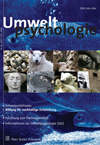Artikeldetails
 Martin Beckenkamp (2008),
Martin Beckenkamp (2008),Zur Kompatibilität von Konfliktstrukturen und Konfliktmanagement am Beispiel eines Muschelfischereikonflikts .
Umweltpsychologie 12(2), 123-139.
Dieser Artikel wurde in deutsch verfasst.
| Zusammenfassung: | Vielen Umweltproblemen liegt eine soziale Dilemmastruktur zu Grunde. Dies wird am Beispiel eines idealisierten Fischereikonflikts deutlich gemacht und aufgezeigt, dass sich durch die die Anreicherung der Konfliktstruktur um Handlungsspielräume neue Lösungen durch die strategische Interaktion ergeben. Jedoch führt die Anreicherung durch die Erhöhung der Anzahl der beteiligten Akteure/innen oder Verkomplizierung der Auszahlungsfunktion zu Hürden, die Ansätze, die alleine auf die Interaktion der Akteure/innen abzielen, erschweren und institutioneller Lösungen bedürfen. Es wird argumentiert, das auch der Ansatz der Veränderung von Werten und Einstellungen der Akteure/innen in solchen Dilemmata zu kurz greift. |
| Schlagworte: | Einstellungen zur Umwelt Institutionelle Umwelt Kooperation Soziales Dilemma Spieltheorie Umwelt |
| Abstract: | The structure of a social dilemma lies behind many environmental problems. Some consequences of this matter of fact will be revealed by taking an idealized fishery conflict as an example. It will be demonstrated that enriching the conflict structure by choices may open the floor to solutions by strategic interactions. However, enriching the conflict structure by augmenting the number of participants or by complicating the payoff-situations of the participants will bring up obstacles that can only be overcome by creating corresponding institutions, and not by aiming at the mere strategic interaction of the participants. It is argued that aiming at attitudes and values of the participants is insufficient as well. |
| Keywords: | Cooperation Environment Environmental Attitudes Facility Environment Game Theory Social Dilemma |
Zum Inhaltsverzeichnis

